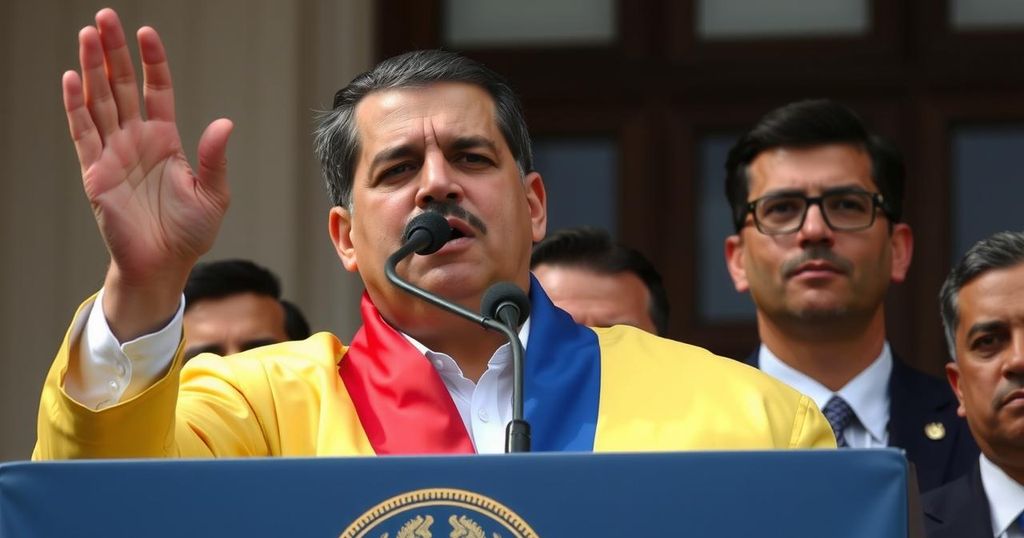Nicolas Maduro is poised to take the oath of office for his third term amidst international backlash and protests against alleged electoral fraud. Key opposition leader Maria Corina Machado was briefly detained following a demonstration, leading to widespread condemnation from global leaders. Countries like Ecuador and Spain have denounced Maduro’s regime, which faces mounting calls for democratic transition amid reports of state repression and violence against dissenters.
On Friday, Venezuelan President Nicolas Maduro is set to take his oath of office for a third term amid significant international ire, as opposition factions and thousands of citizens protest against alleged electoral fraud. A prominent opposition leader, Maria Corina Machado, was reportedly detained following a demonstration in Caracas, an incident that has drawn widespread condemnation from various global leaders. Although the Venezuelan government denies detaining Machado, her team claims she was forcibly removed by security forces, prompting renewed scrutiny of Maduro’s legitimacy in office.
The situation escalated with President-elect Donald Trump labeling Machado and her electoral rival Edmundo Gonzalez Urrutia as “freedom fighters” on social media, advocating for their safety and well-being. Countries such as Ecuador and Spain have strongly denounced Maduro’s government as a dictatorship, with Spain explicitly condemning Machado’s detention. Italy’s Prime Minister Giorgia Meloni also criticized the regime, emphasizing the need for a democratic transition within Venezuela.
Amidst these developments, the Venezuelan government continues to report what it calls an international conspiracy against its stability, leading to the closure of its border with Colombia. Machado remains defiant, asserting that her supporters are unafraid. Protests occurred not only in Caracas but also in Paris, indicating widespread discontent with Maduro’s regime.
Concerns regarding increased repression prior to Maduro’s swearing-in are underscored by reports of other arrests, including an opposition candidate and activists advocating for press freedom. The United Nations has voiced erosion of civil liberties in the country, highlighting the ongoing violence against critics of the government.
Maduro has firmly held power since 2013, navigating through a politically charged environment and an economic crisis that has decimated the Venezuelan economy. His government sustains itself through the loyalty of military forces and external support from nations such as Russia and Cuba, despite international condemnation and allegations of systemic electoral fraud.
The article discusses the tense political climate in Venezuela as President Nicolas Maduro prepares to be sworn in for a third term amid accusations of electoral fraud and suppression of dissent. The situation is exacerbated by the recent detention of Maria Corina Machado, a key opposition figure, which has incited global condemnation and brought attention to human rights violations occurring under Maduro’s administration. This context highlights the complexities of governance and civil liberties in Venezuela, particularly as Maduro’s regime faces an opposition determined to challenge its legitimacy.
In conclusion, the forthcoming inauguration of President Maduro occurs under a shadow of international condemnation and civic unrest. The detention of opposition leader Maria Corina Machado has heightened tensions, exemplifying the broader struggle between the Maduro government and dissenting voices advocating for democracy and human rights. With numerous countries publicly denouncing Maduro’s government, the situation in Venezuela remains precarious, requiring vigilant international attention as citizens continue to advocate for change.
Original Source: www.cbsnews.com






